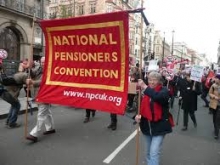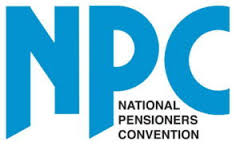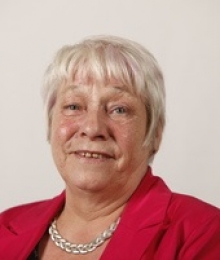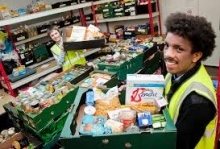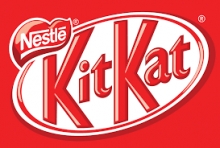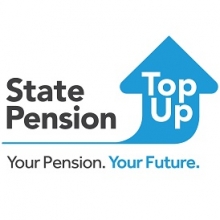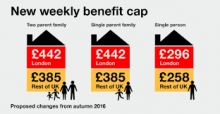Work TV
Watch our TV Channel dedicated to the ‘World of Work’. Explore our video library for informative videos featuring career opportunities at leading companies, franchising opportunities, further education and recruitment professions and their services.
Simon Collyer
Pensioners Day of Action Westminster on November 2nd
Don’t think Britain’s pensioners are there to be walked over.
Hundreds of pensioners from across the UK will gather in Westminster on November 2nd to lobby their MPs over the state pension “triple lock”, the funding crisis in social care and the future of universal benefits such as the winter fuel allowance.
The protest, organised by Britain’s biggest pensioner pressure group - the National Pensioners Convention (NPC), will address the suggestions that have been made recently by both Iain Duncan Smith and Baroness Ros Altmann that the “triple lock” should be scrapped.
Dot Gibson, NPC general secretary said: “The idea that the “triple lock” is too generous is ridiculous. In the last five years, it has only provided a higher increase than the pre-2010 arrangement on just one occasion. Next year the old basic state pension is likely to rise by around £3 a week and just £1.80 for millions of women who don’t receive a full pension, but the new state pension will go up by around £3.90. This is completely unfair.”
The Convention also points out that universal pensioner benefits such as the winter fuel allowance and the concessionary bus pass are constantly under attack from those who claim older people have escaped austerity at the expense of younger generations. The reality is that many young and older people have been affected by the cuts, and setting one age group against another is extremely divisive.
One of the key areas services facing cuts has been that of social care. Since 2010, social care budgets have been cut by around £5bn. The system suffers from a postcode lottery of charges, limited access to services, badly paid and poorly trained staff, a lack of proper regulation, low standards, inadequate “flying” 15-minute visits and a lack of dignity for both staff and residents.
“Every week, we come across examples of how older people have been let down by the care system”, said Ms Gibson. “In the last six years, over £5bn has been cut from social care budgets, 1.8m people no longer get services at home and half of all care homes are facing financial problems. It’s clear we need a new model for social care – one that shares the cost across society as a whole and which can improve access to services, as well as standards of care. We need a National Health and Social Care Service (NHSCS) funded through taxation.”
“The general public, those involved in the care sector and older people and their families are way ahead of the politicians on this issue. They know the current system isn’t working and more of the same just isn’t going to solve anything. We need something bold to tackle the major problems facing the sector. Waiting until 2020, as the government has suggested, will effectively mean that older people are left to suffer for years and for some it will be too late. That is completely unacceptable,” Ms Gibson added.
Programme for the day
- * 11.30am – Photo opportunity/protest at Old Palace Yard (opposite House of Lords) involving campaigners with placards and banners.
- * 1pm – Rally, Committee Room 14, House of Commons. Speakers include Dot Gibson (NPC), Ian Blackford MP (SNP), Heather Wakefield (UNISON) and John McDonnell MP (Shadow Chancellor)
* 3pm onwards – Lobby of MPs
Damning Academic Research Shows Tory Sanctions Push Vulnerable into Debt and Destitution
Sandra White, the Convener of the Scottish Parliament’s Social Security Committee, will today lead a Holyrood debate on the UK Government’s dehumanising and ineffective sanctions system. The parliament will be debating academic research by Glasgow University which shows the UK Government’s sanctions regime has “detrimental financial, material, emotional and health impacts” and pushes those on JSA and ESA into debt and reliance on food banks.
The study showed that benefit sanctions were often out of proportion to the offence, such as being a few minutes late to an appointment, and that poor communication meant that some of those sanctioned did not understand why.
Those sanctioned commonly turn to borrowing, with some ending up “near-destitute, using food banks” and in extreme cases being “pushed towards ‘survival crime’”.Additional research published last week from the University of Oxford found a “robust link” between the numbers of benefit sanctions and demand for food banks.
Commenting, SNP MSP Sandra White said:
“The evidence is absolutely overwhelming – the UK Government’s sanctions regime is dehumanising, ineffective and pushes people into destitution and reliance on food banks, often at no fault of their own.
“The Tory Government approach to benefit claimants is to presume guilt and to punish disproportionately. Not only does this fail to help jobseekers find work, but it puts many people in the position where they’re simply penniless – which is why food bank providers identify sanctions as one of the key drivers for their growth.
“This punitive benefit sanctions regime should be a stain on the conscience of the Tory Government. Theresa May’s Tories need to listen to those who have continually called for changes to this unfair and disproportionate system. An immediate and urgent review is needed of the claimant conditionality and sanction regime and sanctions should be paused until this is done.”
Hillary Clinton Leads in the Polls But it Ain't Over Yet
With 11 days to go before the U.S. presidential election, Democratic nominee Hillary Clinton leads Republican Donald Trump by 15 percentage points among early voters surveyed in the past two weeks, according to the Reuters/Ipsos States of the Nation project.
Though data is not available for all early voting states, Clinton enjoys an edge in swing states such as Ohio and Arizona and in Republican Party strongholds such as Georgia and Texas.
An estimated 19 million Americans have voted so far in the election, according to the University of Florida’s United States Election Project, accounting for as much as 20 percent of the electorate. However the FBI 'email' investigation could sink Hillary.
It could be an exciting finish in the race to run the worlds biggest economy.
On Friday, we get U.S. unemployment figures for October.
Australian Fabians Explain Labour Theft
The Australia Fabians are a volunteer organisation committed to the cause of equality. This is an excellent video about inequality and fully relevant to those in the rest of the world.
‘Labour Theft’ is a very interesting concept and an excellent way of explaining the growing insecurity of workers. The ‘feminization of work’ is another interesting way of headling another important discussion point.
Have you considered joining the Fabian Society or a trades union? Watch this video below and you might decide it is a good idea.
Click on logo to go to the Fabian Society website:
Now Tea Goes Up - Families Face Uncertain Future
Typhoo is the latest company to increase the cost of it's products. Those on low incomes are going to have to find more money to finance their daily 'cuppa' at a time that benefits are being cut or frozen. Triple lock pensions will take some financing if prices continue to surge.
Energy experts have today warned that the crash in the value of the pound and increased wholesale costs since the EU referendum could lead to Energy suppliers introducing a five per cent rise in electricity bills this winter costing 18 million families on standard tariffs an extra £465 million a year.
The British Retail Consortium earlier this month that families would pay higher prices in shops if the UK government opts for a hard Brexit – with the cost of everyday goods rising as a result of tariffs. British Airways have also warned of higher air fares due to weak pound’.
Families are now facing winter with uncertainty over their jobs and the affordability of basic living essentials, like food and fuel.
Foodbank Use Rises
Latest figures published by The Trussell Trust today show that foodbank use remains at record levels, rising two percent on last year. 1,109,309 three day emergency food supplies were provided to people in crisis by the charity’s network of 424 foodbanks in the 2015/16 financial year, compared to 1,084,604 in 2014/15. Of this number, 415,866 went to children. This is a measure of volume rather than unique users, and on average, people needed two foodbank referrals in the last year.* [see notes to editor]
For the first time, The Trussell Trust has also partnered with the University of Hull to develop new tools that help us better understand the drivers of foodbank use, and areas of greatest need, by mapping foodbank data against census data. The early findings of this new research reinforce the trends seen by foodbanks related to benefits problems and low income.
Scottish Campaigners Call for £5pw Child Benefit Increase
With only a week to go before the Scottish Government’s consultation on social security closes the child poverty campaigners draw on their social security expertise to publish a paper highlighting key areas where use of new powers could boost family incomes in the face of increasing pressure on household finances.
Chief amongst CPAG’s proposals is for Scottish Government to use new ‘top-up’ powers to increase child benefit in Scotland by at least £5 a week. The campaigners say this policy alone could reduce child poverty in Scotland by a substantial 14%, lifting 30 000 children out of poverty. Other recommendations set out the importance of benefits being delivered by a new national agency; how devolved social security can ensure disabled people are treated with dignity and respect and how universal credit can be delivered in a way that works for families in Scotland.
Kit Kat - Next Up for A Potential Price Hike
Inflation looks like eating into benefits (pun excused).
This is very bad news since the government started setting benefits by cash value rather than leaving them linked to the Consumer Price Index.
Latest product to look like it could cost more soon is the humble KitKat.
The British were up in arms when Marmite and other major brands momentarily disappeared from shelves because of a row over the falling pound. Now the Kit Kat might be the next to fall foul of the slumping currency.
The cost of the four-fingered chocolate bar, as well as other products made by Nestlé could rise, the firm said, because of sterling’s woes. Its chief executive, Peter Bulcke, said price rises was one of the options being considered.
The Swiss firm on Thursday cut its sales target for the year because of currency devaluation and sluggish growth. It reported an organic growth rate of 3.3 percent in the three quarters to September (it had forecast 4.2 percent) and lowered its full-year growth forecast to 3.5 percent.
Wot next, Maltesers? Where will it all end, we ask? Benefits are not going up by 15%

State Pension Top-up
State Pension top up lets those who reached State Pension age before 6 April 2016 boost their State Pension income by up to an extra £25 per week. It is:
- open for a limited period, until 5 April 2017
- based on a lump-sum contribution
- index linked
- guaranteed for life
- usually 50% to 100% inheritable by a spouse or civil partner
For further details visit State Pension top up.
https://www.gov.uk/statepensiontopup
State Pension top up
Telephone: 0345 600 4270
Textphone: 0300 200 3519
Monday to Friday, 8am to 8pm
Saturday, 8am to 4pm
Find out about call charges
Welsh language
Telephone: 0300 200 1900
Monday to Friday, 8.30am to 5pm
Find out about call charges
Changes to The Benefit Cap Commence Shortly
From 7 November 2016, the current benefit cap levels will be lowered as part of the Welfare Reform and Work Act (2016). At the same time, we are introducing additional exemptions for households entitled (or with underlying entitlement) to Carer’s Allowance, Guardian’s Allowance or an award of Universal Credit which includes the carer’s element.
Claimants who could be affected by the changes to benefit cap levels have now been notified and offered employment support to help them adjust to their circumstances. Claimants have also been offered support on budgeting and with housing costs.


